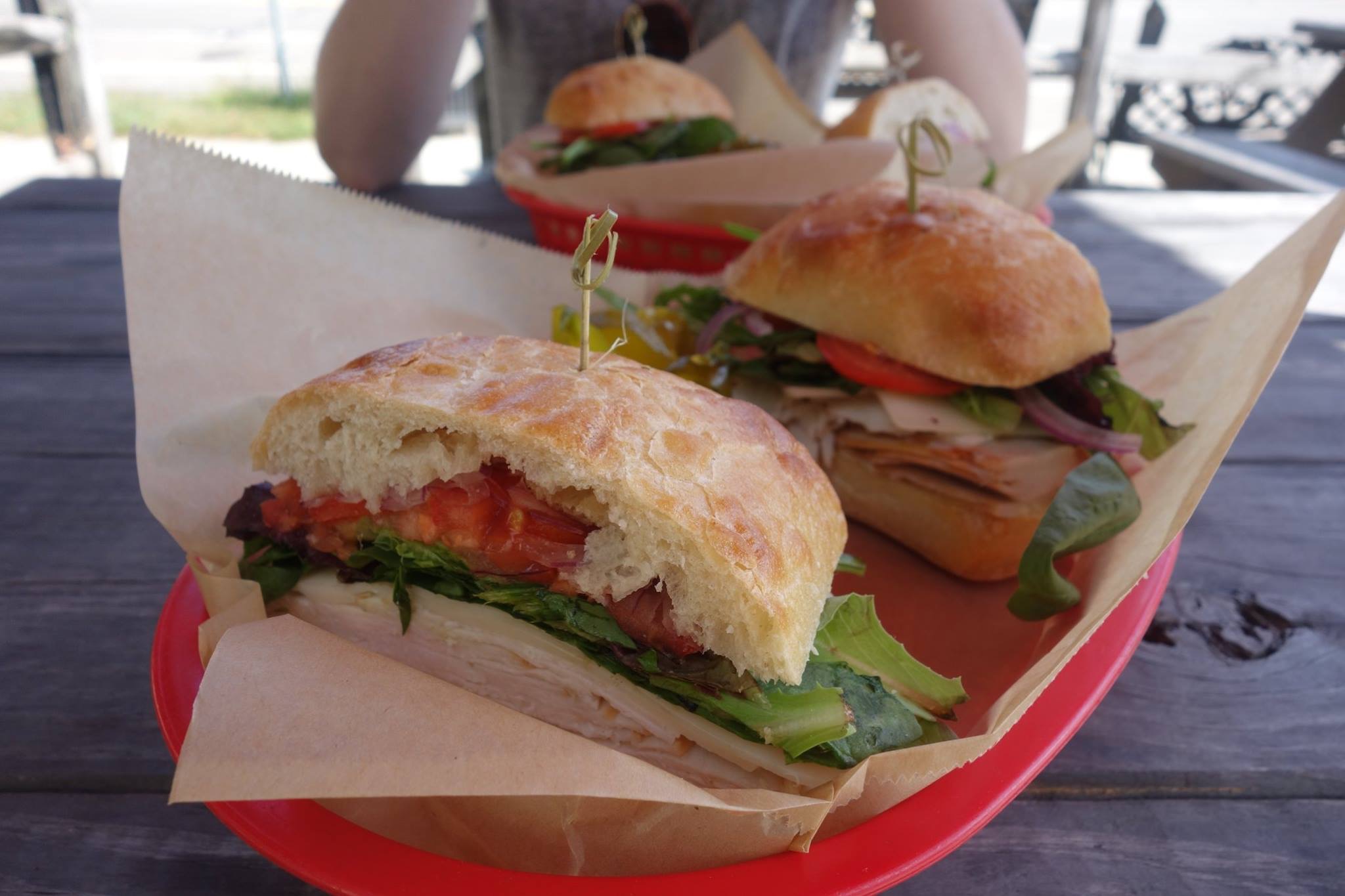Ten minutes from the Connecticut College campus stands a cafe which prides itself on handcrafted food. One can spot it from the wooden picnic tables out front, a feature that reminded me of a lobster shack on Cape Cod. Inside are wooden tables and chairs with orange cushions, and the kitchen is visible to the customer’s eye. When you first walk into the restaurant, a chalkboard displays the menu. It’s the only one, as Montauk does not use printed menus. Instead, they keep the chalkboard up-to-date, and it currently features several sandwiches, tacos, salads, and soups. Montauk brings a delicious new meaning to hand-crafted food and the setting for such a meal—at home rather than in a cafe.
On a warm and sunny Thursday afternoon, there was no better place to be than under an umbrella enjoying a lovely sandwich with one of my friends. I ordered the roasted turkey sandwich with swiss, tomato, greens, red onion, and garlic mayo on a ciabatta roll with a side of handcrafted pickles. Sitting on the wooden picnic tables with a red, woven plastic plate, I felt like it was summer again. The sandwich burst with flavor; the bread was soft and warm; and the pickles were seasoned with just the right of amount of spice. My mouth is watering with the hope of going back soon to bite into a Montauk House sandwich once again.
After my friend and I enjoyed our delightful lunch, I sat down with Robert Ramsay, the owner of Montauk House Cafe. When I asked him about the name, he said that “Montauk” comes from being located on Montauk Avenue, but “it was really always meant to be Montauk House” or as some frequent customers call it, “MH.” For twenty years Ramsay drove by this location and remarked how it looked like “a little Cape Cod house.” This is no exaggeration because the house has wooden siding and is quite small. “We utilize one-hundred percent of our space,” Ramsay said. The size works to their advantage as it adds to the feeling that you are eating as a guest in someone’s home. Ramsay explained that “the idea is that people get to see you making the food.” Their goal “was that you come into this little house [that] looks like this little Cape Cod house [where] you get local ingredients…and you feel like it’s some home cooking.” This sensation adds to the “different experience” that Ramsay is shooting for at Montauk House.
Ramsay spearheaded a catering company in Washington, D.C. and then moved to New York, where he shifted his focus to working in restaurants to restaurant consulting. Although he still consults in New York, he is invested in the New London community. He started an “applied learning” program called Cultivator Kitchen, which invites entrepreneurs to learn more about the restaurant business.
Beyond business, healthy, handcrafted, and fresh food is also important to Ramsay. He said that he and his fellow chefs “work with their hands.” In fact, they do not use a lot of recipes. Instead, they judge a dish on its taste and appearance, which according to Ramsay, is what “inspires [him] to cook.” MH also supports the community by working with local companies instead of larger corporations.
Ramsay commented that there are a lot of restaurants in New London, but not all of them pull in “people who are foodies.” MH, however, strives for foodie appeal, as exemplified by one of their most popular sandwiches: the falafel wrap. According to Ramsay, they follow an intricate and time-consuming process: “We soak [dried] beans overnight and use garlic, fresh cilantro, fresh coriander…make the mix, and then we grind them down, make the balls, and we scoop fry them to order.” They then add pickled onions, quinoa tabouli, tahini, and crumbled feta to garnish the wrap.
Montauk House was originally supposed to be a test kitchen, but due to its success, it has remained in New London and will celebrate its two-year anniversary this January. Next month, Ramsay will have a pop-up restaurant and expand to a new space downtown on 86th and Goldman Street, where the Cultivator Kitchen program is currently located. Ramsay’s ambitions do not end there; he strives to make quality and handcrafted food more accessible to students. He believes that students want “different experiences and better options on campus.” We ended our chat with Ramsay’s call-to-action for students to take the idea of a student-run food spot on campus to faculty and staff. Ramsay’s suggestion could provide students with an opportunity for different experiences with food. By participating in the business-development end of the operation, students could gain entrepreneurial skills while putting the liberal arts into action.










